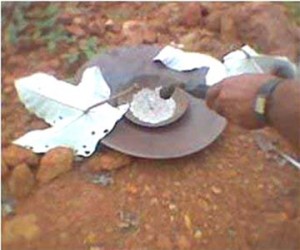Guyana’s gold mining sector could find it difficult to maintain its current levels of production unless the industry pursues mercury-free options in the wake of the decisions by the European Community and the United States to ban mercury exports according to a report released by the secretariat of the World Wildlife Fund (WWF) recently. But the Report says that the WWF is confident that the mercury-free exploitation of the country’s gold resources can be achieved without compromising the contribution of gold to the country’s economy.

And according to the report the local gold mining sector needs to start investigating alternatives to mercury use in the gold production process and the training of miners in those alternative processes. The Report also calls on government to provide incentives to miners who are prepared to invest in mercury-free technologies.
A ban on mercury exports from the 27-nation EU bloc implemented on September 25th last will come into force in March 2011 while a similar mercury export ban effected on October 19th by President George Bush under legislation sponsored by Democratic Party President-elect Barack Obama will come into effect on January 1, 2013.
According to the WWF Report the ban on mercury exports by the EU and the United States which, collectively, represent by far the world’s largest suppliers of the commodity will see a significant price rise from the present $5,000 per kg at the initiation of the export ban and will continue to rise as mercury becomes scarcer.
Although sources in the local gold mining sector have told Stabroek Business that the process requires relatively small quantities of mercury. It is acknowledged that vastly reduced access to mercury could significantly affect gold output and have a knock-on effect on the economy.
Last year production in the local mining sector yielded 246,199 ounces of gold valued at $32.8 billion and accounted for 6.2 per cent of Guyana’s Gross Domestic Product. According to the WWF Report, gold mining provides direct employment for around 11,200 persons and additional indirect employment for more than 30,000 additional persons.
Last year, the value of gold exports to the United States was estimated at US$158.2m, equivalent to 38.3 per cent of all mining exports.
Noting that all of the gold produced locally was done using mercury the Report said that a scarcity in mercury supply will make the cost of local gold production more expensive since apart from the fact that local miners are not familiar with those techniques, these require additional capital investment and competent technical skills if they are to be efficient.
Meanwhile the WWF has announced that it has initiated a 6-day November 16 – 21 visit to French Guiana for four representatives from the Guyana Gold and Diamond Miners Association (GGDMA) to witness the practice of mercury-free gold mining methods. The use of mercury in the mining of gold in French Guiana was banned in 2006.





